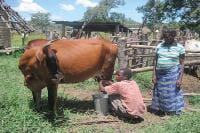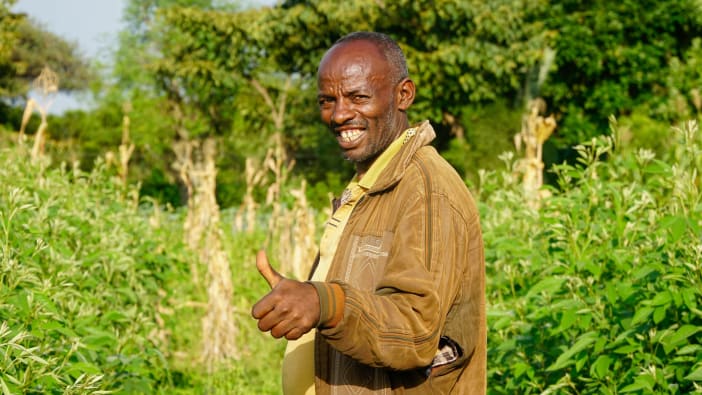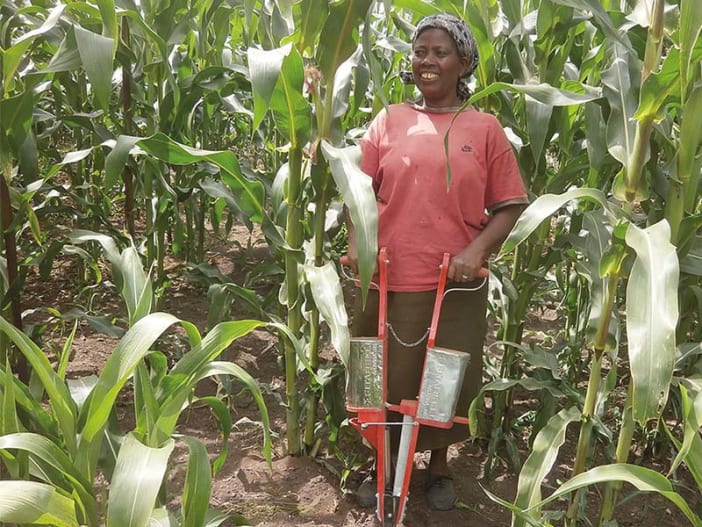The following script is designed to be a radio play. It discusses the importance of proper sanitation and hygiene when working with cattle in a dairy. It uses an element of mystery to catch and hold the listener’s attention, and maintains it with quick and clever dialogue throughout the drama.
Ask people at your radio station to play the three parts. Try to find people with distinctive voices so that your listeners won’t be confused by the fast-paced dialogue. Make sure they have rehearsed their parts so that things will go smoothly on the air. You can add to the drama by creating some simple sound effects. Animal noises, footsteps, and the sounds of doors or gates opening and closing can help your listeners visualise the dairy farm where this story takes place.
This programme features the adventures of Vicky and Eddy. It was adapted by Farm Radio International from a weekly series on agriculture for rural youth of the Americas, produced by Inter-American Institute for Cooperation on Agriculture in Costa Rica (www.iica.int).
Characters
- Vicky
- Eddy
- Farmer Sam
- Announcer
Scene one
Vicky: Hey Eddy, what’s the matter? You seem a little upset.
Eddy: Yes, I just came from the dairy and Dorothea the cow is sick.
Vicky: Oh, poor Dorothea. What does she have?
Eddy: She has mastitis. I am very worried.
Vicky: I can see that. Do they know why she got sick?
Eddy: No. They told me at the dairy that they still don’t know the cause.
Vicky: Oh well, don’t worry. She’ll get better, I’m sure. I’ll go and see her this afternoon, and if there is anything new, I’ll call you.
Eddy: Okay, that’s fine.
Scene two
Sound effects: Phone ringing
Eddy: Hello?
Vicky: Hello, Eddy. It’s me, Vicky. You must come to the dairy immediately. I think I have found the cause of Dorothea’s llness.
Eddy: Why? What happened?
Vicky: Come to meet me here, and I will explain it to you.
Eddy: Okay. I’ll be right there.
Scene three
Sound effects: Cow noises in the background
Vicky: (Whispering) Over here, over here...
Eddy: Vicky, what are you doing there? Why so much mystery?
Vicky: Shhh! Lower your voice. I don’t want them to hear us.
Eddy: We are going to get in trouble for being here.
Vicky: I know, but listen to this. The boy milking the cows didn’t even wash his hands before starting to milk. This means that he is not following proper sanitary procedures.
Eddy: What a shame! No wonder Dorothea and the other cows are sick!
Vicky: We are going to have to do something about it.
Eddy: I think that we should separate and investigate a little more, to see if – I don’t know – if we find other problems.
Vicky: Good idea. You look around. I’ll stay here.
Eddy: Okay.
Scene four
Vicky: Eddy, did you find something?
Eddy: Yes, and I think that it’s urgent that we talk to Farmer Sam, so he can implement an Animal Health Programme, before…
Farmer Sam: (interrupting) Guys, what are you doing here? This is private property.
Vicky: Hmm… um… well
Eddy: Farmer Sam, excuse us for having come in without your permission, but we have toured the dairy and have found some problems that are endangering the health of the animals.
Farmer Sam: What are you talking about? Please explain yourselves.
Vicky: Okay. First, have you heard about the Animal Health Programme?
Farmer Sam: I think so. But, I am not quite sure. What is it exactly?
Eddy: With an Animal Health Programme, you can control animal diseases, and you also prevent them. The programme consists of three parts. The first is to prevent the entry of new diseases, the second is to examine and evaluate the diseases that are already present, and the last is to develop a control strategy. Let’s go over to Dorothea’s stall and we can tell you more about it.
Fade out scene
Scene five
Vicky: Look, Farmer Sam, we believe that the cause of the mastitis in Dorothea and the other cows is that some of the milkers don’t wash their hands before milking. And they don’t disinfect the udders either.
Farmer Sam: Yes, that’s possible, because one of my sons just started doing the milking – he has never done it before. I will talk to him, and explain why it is so important to keep clean when working with the cows.
Eddy: Farmer Sam, as you know, if you don’t follow an Animal Health Programme, other new diseases may appear.
Farmer Sam: Okay, but you still haven’t told me about other problems you have found on the farm.
Eddy: To begin with, the fence that separates your property from the neighbour is in bad shape. You should fix it as soon as possible, so the neighbour’s cows do not come into contact with yours. Also, one of your dogs was wandering by the cow pen. Other animals should not go in there, only the cows.
Farmer Sam: (irritated) Probably the dog came in by the same place you did, didn’t he?
Vicky: Well, yes, but that’s not the issue. I wanted to ask you what you do with the new cattle arriving at the dairy.
Farmer Sam: When new cows arrive here at the farm, I keep them separated from the rest, for at least 28 days. Also, I call the veterinarian and he does several blood tests to evaluate their health status. After that, I allow them to mix with the rest of the animals.
Eddy: That is excellent – you are taking the proper steps. The next part of the Animal Health Programme is to determine what animal diseases already exist on the farm. Try to find out which animals are sick and find the cause of the disease. Then you can try to eliminate the disease, either with vaccines or with some chemical treatment.
Farmer Sam: I want to tell you Eddy and Vicky that you have done an excellent job as researchers. I never realised that my animals were exposed to so many risks. From now on I will be more careful, and put into practice that famous ‘Animal Health Programme’!
Play music as announcer speaks
Announcer: Remember there are three parts to an Animal Health Programme. The first is to prevent the entry of new diseases on to your farm, the second is to examine and evaluate the diseases that are already present, and the last is to develop a control strategy.
End music
Farm Radio International
Farm Radio International is a Canadian charity working with over 400 radio broadcasters in 38 African countries to fight poverty and food insecurity. They support African radio broadcasters to meet the needs of local small-scale farmers and their families in rural communities.
They develop radio scripts and information packages to share with African broadcasters. They also offer a weekly electronic news service (http://weekly.farmradio.org/) and a special online community for radio broadcasters called Barza (http://www.barzaradio.com/). They, in turn, use these resources to research, produce and present relevant and engaging programmes for their audience of millions of farmers. With partner radio stations they plan and deliver special radio campaigns and programmes that have a specific impact on a development challenge such as soil erosion or banana bacterial wilt.
If you would like to know more, you can visit: www.farmradio.org or contact them by writing to:
Farm Radio International
1404 Scott Street
Ottawa, Ontario
Canada
K1Y 4M8
or by emailing: [email protected]
Writing your own radio scripts or plays If you want to write your own radio scripts or plays for your community, you might want to learn from Farm Radio International’s experience:
- Command attention Everyone loves a story, and we all like to listen in on the lives of other people. Radio dramas can be very effective in commanding attention. However, we recognise that they can be time-consuming and expensive to produce, so we write scripts in a variety of formats including interviews, group discussions and narrated stories.
- Cater to the heart and head We are writing to convey social development messages and to change people’s behaviour. The messages in our scripts appeal to people’s intelligence. But to have lasting impact, they must also touch their emotions. We try to avoid technical language and a ‘teacher’s tone’. Instead, we write in a way that lets the listener place him or herself in the story.
- Call to action We write for radio so that people will listen. But we also write so that people can take action. We try to present practical examples that have been beneficial to a farmer, a rural family, or an entire community, so that others can learn from their experience and copy their success.










